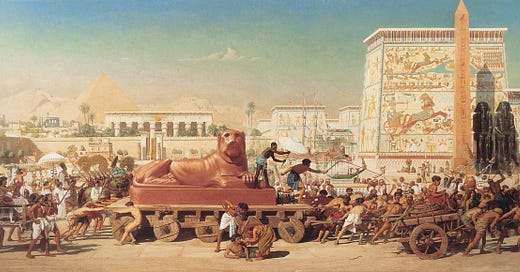Beginning of Months
“And grueling toil didn’t shake Your patient labor in the sand, When whips and shouting from the guards Made your burden the heavier? Without a light of prophet’s voice For years and years in Pharaoh's land What caused your hands that made his bricks To now remember with a meal?” “Forgetting pain, my dearest son Though seeming to be wise, Is not the height of human peace. Redemption is a beauty true And forever crowns suffering. The mighty hand and outstretched arm, Conquered sorcery’s wicked charm, And sandaled feet, with staff in hand, Ran through a doorway drenched in blood.”
And when your children say to you, ‘What do you mean by this service?’ you shall say, ‘It is the sacrifice of the LORD's Passover, for he passed over the houses of the people of Israel in Egypt, when he struck the Egyptians but spared our houses.’” (Exodus 12:26–27)
I wrote this short poem Beginning of Months a few years ago and first shared it when Power & Glory was much smaller. It is a conversation between a father and his son as prescribed in Exodus 12:26–27. The title comes from the institution of the Passover, found in Exodus 12:2: “This month shall be unto you the beginning of months.” The calendar of Israel’s worship was to be centered on their redemption.
We can hear our modern sensibilities in the son’s questioning. Our modern world does not believe in redemption. It may choose cold stoicism; it may choose licentiousness. It may ignore death, or it may become obsessed with it. But it knows nothing of the simultaneous acknowledgment of the reality of moral evil and the reality of the joy of salvation. Redemption is a purely Christian idea. At the center of our faith is the paradox of suffering and goodness.
The Redeemer, who saved a people out of Egypt, shows us an intersection where all these things meet. We do not shun the contemplation of sufferings or their commemoration. We are not ashamed of the Cross of Christ, which to Jews is a stumbling block, to Greeks is foolishness, but to us, is the very power of God. In His sorrowful Passion, our Passover lamb has been sacrificed. Through the door of His bloody Cross, we make our eternal exodus.





@Thomas McKendry, thought you may appreciate